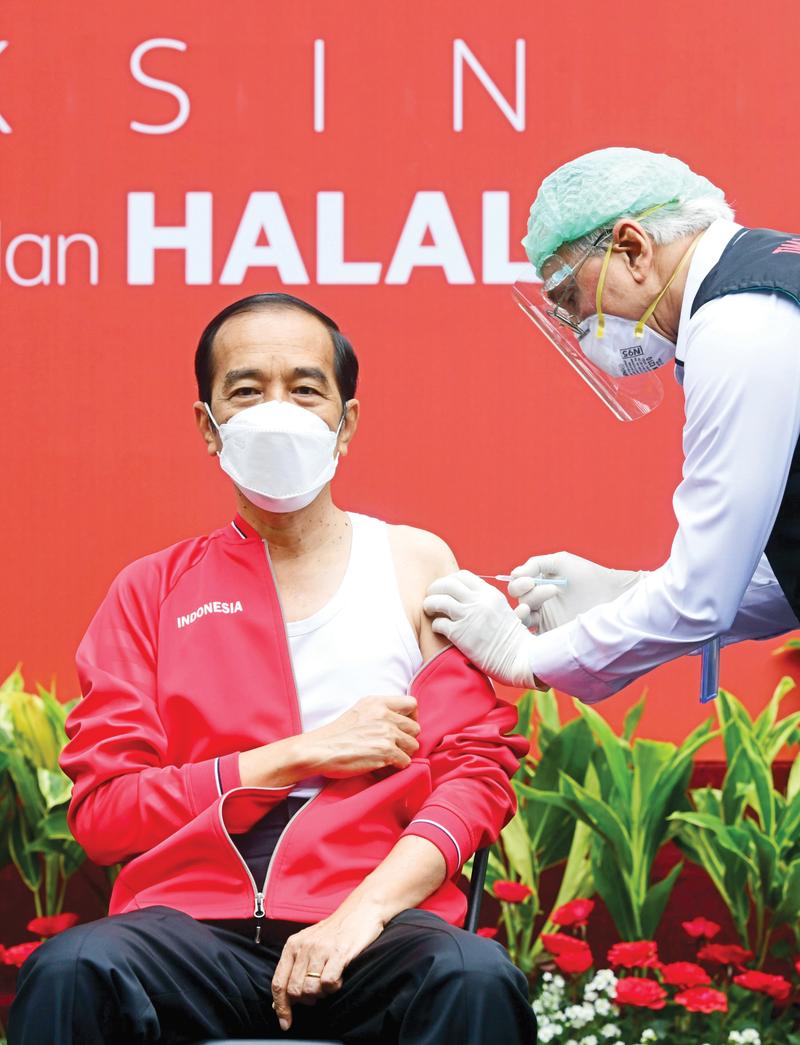 Indonesian President Joko Widodo receives Chinese company Sinovac’s COVID-19 vaccine at the Presidential Palace in Jakarta on Jan 25. (COURTESY OF INDONESIA’S PRESIDENTIAL PALACE / XINHUA)
Indonesian President Joko Widodo receives Chinese company Sinovac’s COVID-19 vaccine at the Presidential Palace in Jakarta on Jan 25. (COURTESY OF INDONESIA’S PRESIDENTIAL PALACE / XINHUA)
The pace of COVID-19 infections worldwide has quickened, breaking the mark of 100 million confirmed cases, but the vaccination efforts seem agonizingly slow and uneven.
Newly found and more transmissible virus strains have contributed to a dramatic increase in the number of confirmed cases globally this year, with more than 500,000 being reported each day on average and more than 2 million deaths in total.
“We are facing the worst health and economic crisis in 90 years. As we mourn the growing death toll, we must remember that the choices we make now will determine our collective future,” said UN Secretary-General Antonio Guterres on Jan 25.
On Jan 28, he reiterated his call for equitable access to COVID-19 vaccines.
“I want to utilize this vital platform today to once again urge all countries, economies, and manufacturers to work with — and through — the COVAX facility to realize the commitments of equitable access, especially for the most vulnerable,” he said.
“We must ensure that vaccines are seen as a global public good — people’s vaccines — accessible and affordable to all,” said the secretary-general in his pre-recorded video message to the High-level Webinar on the African COVID-19 Vaccine Financing and Deployment Strategy.
The top UN official commended the African Union’s efforts through the COVID-19 African Vaccine Acquisition Task Force to secure an additional 270 million vaccine doses for African countries.
Guterres expressed his regret that inequities are growing in COVID-19 vaccine access and use. “We cannot have a world divided between vaccine haves and have-nots.”
In Geneva, Director-General of the World Health Organization, Tedros Adhanom Ghebreyesus, expressed his anguish as well. “Numbers can make us numb to what they represent: Every death is someone’s parent, someone’s partner, someone’s child, someone’s friend,” he said at a WHO news conference on Jan 25, calling for vaccination of health workers and older people to in all countries within the first 100 days of 2021.
He also quoted two reports to show that without equitable access to vaccines, the world would have to face not only a catastrophic moral failure, but also an economic failure.
The United States continues to report the highest number of new cases with the largest number of daily deaths. And in the United Kingdom, Britons are also digesting the news that the virus has killed more than 100,000 in Europe’s worst-hit country.
In the UK, a somber Prime Minister Boris Johnson said: “It is hard to compute the sorrow contained in that grim statistic. The years of life lost, the family gatherings not attended and, for so many relatives, the missed chance even to say goodbye.”
The UK became the fifth country in the world to record 100,000 virus-related deaths, after the US, Brazil, India and Mexico. The US has recorded over 400,000 deaths, the world’s highest total, but its population of about 330 million is about five times that of Britain, with 67 million.
Germany said it is considering almost completely halting inbound flights.
In Brussels, European Commissioner for Health and Food Safety Stella Kyriakides called on Astra-Zeneca on Jan 28 to live up to its obligations on vaccine supply.
“Let me be crystal clear: the 27 European Union Member States are united that AstraZeneca needs to deliver on its commitments in our agreement. We are in a pandemic. We lose people every day. These are not numbers. They are not statistics. These are persons, with families, with friends and colleagues that are all affected as well,” she told the media.
AstraZeneca’s Chief Executive Pascal Soriot has rejected claims that his company was failing to honor its commitments.
In Indonesia, President Joko Widodo on Jan 28 received his second shot of CoronaVac, a Chinese-developed COVID-19 vaccine, two weeks after getting the first jab at the State Palace and launching the country’s national vaccination drive.
The drive is proceeding in all 34 provinces of the country, using the vaccine — developed by Sinovac — for priority groups of people including medical workers, public officials and community leaders.
The Australian pharmaceutical regulator has approved the vaccine from Pfizer and BioNTech to enable the country to begin COVID-19 vaccinations by the end of February.
New Zealand may see local approval for a vaccine as early as next week. But, Prime Minister Jacinda Ardern said on Jan 26: “Given the risks in the world around us and the uncertainty of the global rollout of the vaccine, we can expect our borders to be impacted for much of this year.”
In China, new locally transmitted cases of COVID-19 have been on a decline in January, with 55 cases on Jan 26, the lowest daily number since Jan 11. The lion’s share came from Heilongjiang province in the Northeast. Shijiazhuang, a city going through massive testing, has reduced its new cases to single digits.
Leonardus Jegho in Jakarta, Karl Wilson in Sydney, and Zhou Huiying in Beijing contributed to this report.


